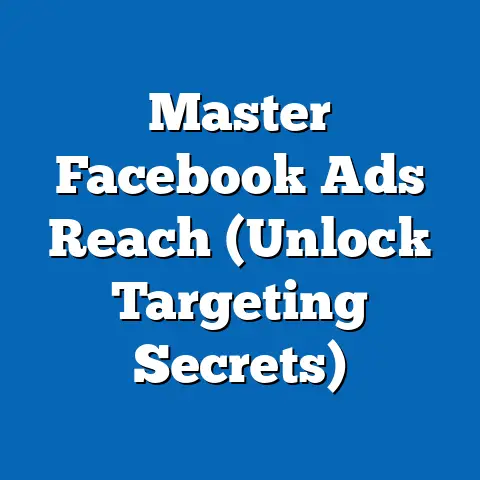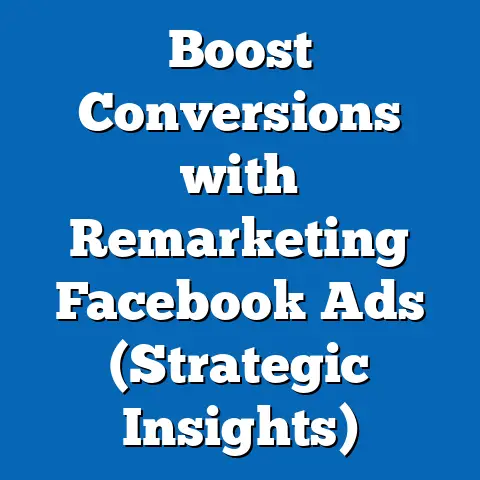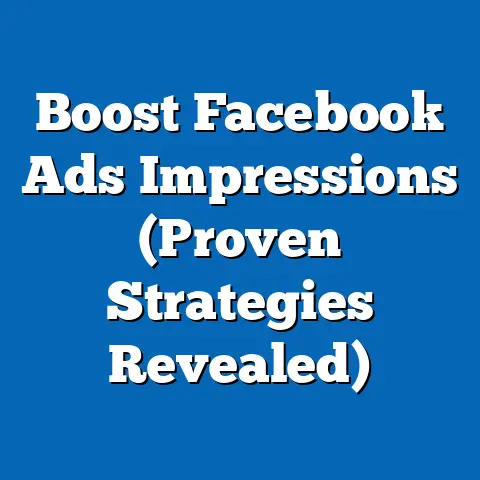Secure Lucrative Facebook Ad Clients (Proven Strategies)
Securing lucrative Facebook ad clients can feel like navigating a crowded marketplace.
Every digital marketer and agency promises the moon, making it tough to stand out.
I’ve been there, struggling to convince potential clients that my expertise is worth their investment.
It’s not enough to simply know Facebook ads; you need a strategy to attract the right clients – those who understand the value of a well-executed campaign and are willing to pay for it.
The digital advertising landscape is fiercely competitive.
Businesses are bombarded with options, and many are wary of spending money without a clear guarantee of results.
According to recent statistics, businesses are expected to spend over $150 billion on digital advertising in 2024 alone, with a significant portion allocated to social media platforms like Facebook.
This underscores the importance of Facebook advertising, but also highlights the need for marketers to prove their worth.
The key isn’t just landing any client; it’s about securing long-term, lucrative partnerships that benefit both parties.
This means finding clients who understand the value of data-driven strategies, creative ad campaigns, and continuous optimization.
It’s about building relationships based on trust, transparency, and, most importantly, results.
Understanding the Facebook Advertising Landscape
Facebook remains a powerhouse in the digital advertising world.
With billions of active users, it offers unparalleled reach and targeting capabilities.
As of early 2024, Facebook boasts over 3 billion monthly active users, making it the most popular social media platform globally.
What’s more impressive is the level of detail Facebook collects on its users, allowing advertisers to target specific demographics, interests, behaviors, and even life events.
Businesses across various sectors are investing heavily in Facebook ads.
E-commerce brands leverage Facebook to drive product sales, lead generation is a priority for service businesses, and brand awareness campaigns are popular among larger corporations.
I’ve found that businesses are drawn to Facebook advertising for several reasons:
- Reach and Scale: The sheer size of Facebook’s user base provides access to a massive audience.
- Granular Targeting: Facebook’s targeting options allow advertisers to reach very specific segments of the population.
- Cost-Effectiveness: Compared to other advertising channels, Facebook ads can offer a high return on investment.
- Measurable Results: Facebook provides detailed analytics, allowing advertisers to track their performance and optimize their campaigns.
However, not all businesses are created equal when it comes to Facebook advertising.
The ideal client is one that:
- Understands the Value of Digital Marketing: They recognize that Facebook ads are an investment, not an expense.
- Has a Clear Business Goal: They know what they want to achieve with their advertising efforts (e.g., increase sales, generate leads, build brand awareness).
- Is Willing to Invest in Quality Creative: They understand the importance of compelling ad copy and visuals.
- Is Open to Data-Driven Strategies: They are willing to let data guide their advertising decisions.
Takeaway: Understanding the Facebook advertising landscape and identifying your target client is crucial for securing lucrative partnerships.
Building a Strong Portfolio
Your portfolio is your resume in the digital marketing world.
It’s the first thing potential clients will look at to assess your skills and experience.
A strong portfolio demonstrates your ability to deliver results and builds trust with prospective clients.
When building your portfolio, focus on showcasing your best work.
Include case studies that highlight your successes with Facebook ads.
These case studies should detail the problem you were hired to solve, the strategies you implemented, and the results you achieved.
I’ve learned that a compelling case study includes:
- Client Background: Provide context about the client’s business, industry, and target audience.
- Problem Statement: Clearly state the challenge the client was facing (e.g., low sales, poor lead quality, lack of brand awareness).
- Strategy and Implementation: Describe the Facebook ad strategies you implemented to address the problem.
Be specific about targeting options, ad formats, and creative elements. - Results: Quantify the results you achieved for the client.
Include metrics like ROI, conversion rates, engagement rates, and cost per acquisition. - Visual Elements: Incorporate visual elements like ad creatives, screenshots of ad performance, and charts showing campaign results.
For example, I once worked with an e-commerce brand that was struggling to drive sales through Facebook ads.
After analyzing their existing campaigns, I realized their targeting was too broad, and their ad creatives were not compelling.
I implemented a new strategy that focused on:
- Precise Targeting: I used Facebook’s custom audiences and lookalike audiences to target specific segments of the population.
- Compelling Ad Creatives: I created visually appealing ads that highlighted the brand’s unique selling points.
- A/B Testing: I continuously tested different ad variations to optimize performance.
As a result, I was able to increase the client’s sales by 30% and reduce their cost per acquisition by 20%.
In addition to case studies, your portfolio should also include:
- Testimonials: Positive reviews from past clients can go a long way in building trust.
- Certifications: Display any relevant certifications you’ve earned (e.g., Facebook Blueprint Certification).
- Blog Posts: Share articles you’ve written about Facebook advertising to demonstrate your expertise.
Takeaway: A strong portfolio is essential for showcasing your expertise and attracting lucrative Facebook ad clients.
Developing a Niche Focus
In the crowded world of digital marketing, specialization can be your superpower.
By focusing on a specific niche, you can position yourself as an expert and attract clients who are willing to pay for specialized knowledge.
Niching down allows you to:
- Become an Expert: By focusing on a specific industry or demographic, you can develop a deep understanding of their unique needs and challenges.
- Stand Out from the Competition: In a sea of generalists, being a specialist can make you stand out.
- Charge Higher Fees: Clients are often willing to pay more for specialized expertise.
- Attract the Right Clients: When you specialize, you attract clients who are a good fit for your skills and experience.
Some niches that have shown substantial growth on Facebook include:
- E-commerce: Online retailers are always looking for ways to drive sales through Facebook ads.
- Health and Wellness: Businesses in the health and wellness industry can use Facebook ads to promote their products and services.
- Local Businesses: Local businesses can use Facebook ads to reach customers in their area.
- Real Estate: Real estate agents can use Facebook ads to generate leads and promote listings.
I once worked with a digital marketing agency that was struggling to attract new clients.
After analyzing their business, I realized they were trying to be everything to everyone.
I suggested they focus on the e-commerce niche, as they had a strong track record of success in that area.
Within a few months, the agency had doubled its client base and increased its revenue by 50%.
By focusing on a specific niche, they were able to position themselves as experts and attract clients who were willing to pay for their specialized knowledge.
When choosing a niche, consider your interests, skills, and experience.
What industries or demographics are you passionate about?
What areas do you have a strong track record of success in?
Once you’ve chosen a niche, tailor your services to meet the specific needs of that niche.
This may involve developing specialized strategies, creating niche-specific ad creatives, or using niche-specific targeting options.
Takeaway: Developing a niche focus can help you stand out from the competition and attract lucrative Facebook ad clients.
Networking and Building Relationships
In the digital age, it’s easy to forget the importance of human connection.
However, networking and building relationships remain crucial for securing lucrative Facebook ad clients.
Building strong relationships with potential clients can lead to:
- Referrals: Happy clients are more likely to refer you to their friends and colleagues.
- Long-Term Partnerships: Building trust and rapport can lead to long-term partnerships.
- Increased Revenue: Long-term partnerships can generate a steady stream of revenue.
- Brand Awareness: Networking can help you build your brand and increase your visibility.
There are several ways to network and build relationships with potential clients:
- Social Media: Leverage social media platforms like LinkedIn and Facebook groups to connect with business owners in your niche.
Share valuable content, participate in discussions, and offer helpful advice. - Industry Events: Attend industry events, webinars, or local meetups to network with potential clients in person.
- Referral Programs: Create a referral program to incentivize existing clients to refer you to their friends and colleagues.
- Personalized Outreach: Reach out to potential clients directly with a personalized message that demonstrates your understanding of their business and needs.
I’ve found that personalized outreach is particularly effective.
Instead of sending a generic email, take the time to research the potential client’s business and identify their specific challenges.
Then, craft a message that addresses those challenges and offers a tailored solution.
For example, I recently reached out to a local restaurant that was struggling to attract new customers.
After analyzing their Facebook page, I noticed they weren’t running any ads.
I sent them a personalized message that highlighted the benefits of Facebook advertising for local businesses and offered to create a free ad campaign to demonstrate the potential results.
The restaurant owner was impressed with my proactive approach and hired me to manage their Facebook ads.
Within a few weeks, I was able to increase their customer traffic by 20%.
Takeaway: Networking and building relationships are essential for securing lucrative Facebook ad clients.
Crafting Targeted Proposals
A winning proposal can be the difference between landing a lucrative client and getting passed over.
Your proposal should clearly communicate your understanding of the client’s needs, your proposed strategy, and the value you bring to the table.
A targeted proposal should include:
- Executive Summary: A brief overview of your proposal, highlighting the key benefits of working with you.
- Client Needs: A clear statement of the client’s needs and challenges.
This demonstrates that you understand their business and are committed to solving their problems. - Proposed Strategy: A detailed description of your proposed Facebook ad strategy.
This should include targeting options, ad formats, creative elements, and a timeline for implementation. - Expected Results: A realistic projection of the results you expect to achieve for the client.
This should be based on your past experience and industry benchmarks. - Pricing: A clear and transparent breakdown of your pricing structure.
This should include your fees, any additional costs, and payment terms. - About You: A brief overview of your experience, skills, and qualifications.
This should highlight your expertise in Facebook advertising and your track record of success. - Testimonials: Positive reviews from past clients can go a long way in building trust.
- Call to Action: A clear call to action that encourages the client to take the next step (e.g., schedule a meeting, sign a contract).
When it comes to pricing, it’s important to communicate the value of your services effectively.
Don’t be afraid to charge what you’re worth.
Remember, you’re not just selling Facebook ads; you’re selling your expertise, experience, and ability to deliver results.
I’ve found that value-based pricing is often the most effective approach.
This involves pricing your services based on the value you provide to the client, rather than simply charging an hourly rate.
For example, if you’re able to increase a client’s sales by 30%, you can charge a percentage of the increased revenue.
This aligns your interests with the client’s and incentivizes you to deliver results.
Takeaway: Crafting targeted proposals is essential for securing lucrative Facebook ad clients.
Implementing Proven Facebook Ad Strategies
While creativity is important, a solid foundation of proven strategies is essential for success.
When pitching to potential clients, it’s important to showcase your understanding of effective Facebook ad techniques.
Some proven Facebook ad strategies include:
- Targeting Options:
- Custom Audiences: Uploading customer lists to target existing customers.
- Lookalike Audiences: Targeting new users who share similar characteristics with your existing customers.
- Interest-Based Targeting: Targeting users based on their interests and hobbies.
- Behavioral Targeting: Targeting users based on their online behavior.
- Ad Formats:
- Image Ads: Simple and effective for showcasing products or services.
- Video Ads: Engaging and attention-grabbing for telling stories and demonstrating products.
- Carousel Ads: Allowing users to scroll through multiple images or videos.
- Collection Ads: Showcasing a collection of products in a visually appealing format.
- Creative Best Practices:
- Compelling Headlines: Grabbing attention with clear and concise headlines.
- High-Quality Visuals: Using visually appealing images and videos.
- Clear Call to Action: Telling users what you want them to do (e.g., “Shop Now,” “Learn More,” “Sign Up”).
- Custom Audiences: Uploading customer lists to target existing customers.
- Lookalike Audiences: Targeting new users who share similar characteristics with your existing customers.
- Interest-Based Targeting: Targeting users based on their interests and hobbies.
- Behavioral Targeting: Targeting users based on their online behavior.
- Image Ads: Simple and effective for showcasing products or services.
- Video Ads: Engaging and attention-grabbing for telling stories and demonstrating products.
- Carousel Ads: Allowing users to scroll through multiple images or videos.
- Collection Ads: Showcasing a collection of products in a visually appealing format.
- Compelling Headlines: Grabbing attention with clear and concise headlines.
- High-Quality Visuals: Using visually appealing images and videos.
- Clear Call to Action: Telling users what you want them to do (e.g., “Shop Now,” “Learn More,” “Sign Up”).
I’ve found that A/B testing is crucial for optimizing ad performance.
This involves testing different ad variations to see which ones perform best.
You can test different headlines, visuals, call to actions, and targeting options.
For example, I once worked with a clothing retailer that was running Facebook ads to promote their new collection.
After analyzing their ad performance, I noticed that their click-through rate was low.
I decided to A/B test different headlines to see if I could improve their click-through rate.
I created two ad variations with different headlines:
- Ad Variation 1: “Shop Our New Collection”
- Ad Variation 2: “Get 20% Off Our New Collection”
After running the ads for a week, I found that Ad Variation 2 had a significantly higher click-through rate.
By A/B testing different headlines, I was able to improve the client’s ad performance and drive more traffic to their website.
It’s also crucial to stay updated on Facebook’s advertising policies and algorithm changes.
Facebook is constantly evolving, and what worked yesterday may not work today.
By staying informed, you can ensure that your campaigns are compliant and effective.
Takeaway: Implementing proven Facebook ad strategies and staying updated on Facebook’s policies and algorithm changes is essential for success.
Demonstrating Results and Retaining Clients
Securing a client is only half the battle.
Retaining that client requires demonstrating ongoing value and building a long-term partnership.
Methods for reporting results to clients include:
- Analytics Tools: Using Facebook Ads Manager, Google Analytics, and other analytics tools to track ad performance.
- Performance Dashboards: Creating custom dashboards that visualize key metrics and trends.
- Regular Reports: Sending clients regular reports that summarize ad performance and highlight key insights.
I’ve found that setting up regular check-ins and feedback sessions is crucial for maintaining open communication and building trust.
This allows you to discuss ad performance, address any concerns, and solicit feedback on your strategies.
It’s also important to be transparent about your results.
Don’t try to hide or downplay any negative results.
Instead, explain what you’re doing to address the issues and improve performance.
Strategies for upselling additional services or renewing contracts include:
- Demonstrating Ongoing Value: Showcasing the results you’ve achieved for the client and highlighting the benefits of continuing to work with you.
- Offering Additional Services: Suggesting additional services that can help the client achieve their goals.
- Providing Exclusive Offers: Offering clients exclusive discounts or promotions for renewing their contracts.
For example, I once worked with a local business that was running Facebook ads to generate leads.
After a few months, I was able to significantly increase their lead volume and improve their lead quality.
I then suggested they invest in additional services, such as email marketing and retargeting, to nurture those leads and convert them into customers.
The client was impressed with the results I had achieved and agreed to invest in the additional services.
Takeaway: Demonstrating results and retaining clients is essential for building a sustainable Facebook ad business.
Conclusion
Securing lucrative Facebook ad clients is a challenging but rewarding endeavor.
By understanding the Facebook advertising landscape, building a strong portfolio, developing a niche focus, networking and building relationships, crafting targeted proposals, implementing proven Facebook ad strategies, and demonstrating results and retaining clients, you can effectively attract and retain clients who see the value in investing in Facebook advertising.
While the landscape is competitive, with the right approach, you can position yourself as an expert and attract clients who are willing to pay for your specialized knowledge.
Remember to stay updated on Facebook’s policies and algorithm changes, and always be transparent about your results.
The potential for growth and success in the Facebook ads niche is immense.
By taking action and implementing these strategies, you can build a thriving Facebook ad business and achieve your financial goals.




